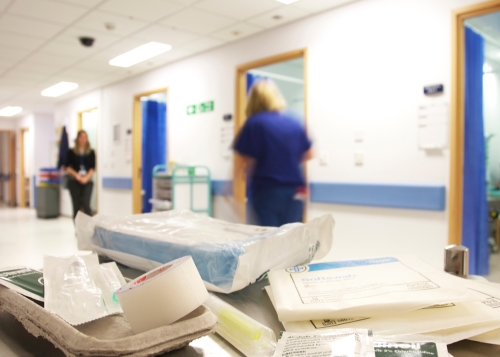A new report has shed light on the strain Welsh emergency and urgent care departments are facing.
Llais, an independent health and social care scrutiny body set up by the Welsh Government in 2022, recently published its review into emergency and urgent care in Wales.
“The system is broken but the staff are fantastic”
Patient quoted in Llais report
The findings in the report were drawn from 42 visits to emergency departments, minor injury units and medical assessment units and from feedback from more than 700 service users.
Those behind the report said the investigation made it clear that urgent and emergency care was “failing too many people”, and that improvements were happening too slowly.
“The crisis must not be accepted as ‘just how things are’,” they warned.
Patients told Llais how they felt there were not enough staff to keep up with demand on these units.
A patient at the University Hospital of Wales Assessment Unit said it was “traumatic” to be treated in what they said felt like a “war zone”.
They added: “[Doctors] and nurses are rushed off their feet. Not fair on patients or staff.”
Another patient, who was treated at Glangwili General Hospital A&E, said: “Numerous times I had to remind nurses they’d forgotten something.
“Once they’re called off to do something, they’re so busy they forget.”
Others highlighted the resilience and kindness of clinicians despite the strain services were under.
The report, titled Getting urgent and emergency healthcare in Welsh hospitals, said staff were going “above and beyond” to keep up with demand.
A Prince Charles Hospital A&E patient said: “The system is broken but the staff are fantastic.”
One patient from University Hospital of Wales A&E said that staff were clearly “rushed for time” but still conducted thorough checks.
On the other hand, patients also told the report how they had been discharged too early, or without enough information post-discharge to recover properly.
Meanwhile, some complained of poor communication between departments or specialists.
Following the publication of Llais’ report, a nurse told local media that A&E work in Wales was becoming “increasingly unsafe”.
The report acknowledged that the Welsh Government and NHS had recently published various plans and statements of intent to improve urgent and emergency care, including A Healthier Wales.
However, Llais wrote: “The reality of what we’ve heard and seen over recent months makes it difficult for people to see how any of these commitments and requirements are helping to make things better for those of us who need emergency care now, and in the weeks and months ahead.
“Emergency care in Wales isn’t working for far too many people.
“Urgent action is needed to restore and rebuild confidence in the ability of our NHS to care for us when we need it in an emergency.”
Llais made a series of recommendations for the Welsh Government and NHS Wales.
“The voices we’ve heard paint a stark picture of a system under immense pressure”
Alyson Thomas
Among these recommendations were for the reduction of waiting times, through “coordination” between health and social care to prevent system bottlenecks.
Not long after this report was published, the Welsh Government announced an additional £30m for 2025-26 to tackle delayed discharges into social care.
Meanwhile, Llais also recommended better sharing of best practice between providers, and for “real-time feedback” from patients to be better used to make improvements.
The report also contained a plea for change to be visible, and for “clear timelines” on how things will change.
Llais’ recommendations fell under six headings: focus on joined up action and accountability; provide clear leadership; reduce waiting times and overcrowding; prioritise dignity and comfort; embed people’s voices in change; and spread what works.
Llais chief executive Alyson Thomas said, following the publication of the report: “The voices we’ve heard paint a stark picture of a system under immense pressure.
“While we commend the dedication of healthcare staff, they are working in a system that is not giving them or the people they care for the support they need.
“Welsh Government and NHS Wales must act now to turn strategies and plans into meaningful change.”
Ms Thomas said there must be “immediate improvements” to ease the ongoing crisis in urgent and emergency care.
In response to the report and its recommendations, a Welsh Government spokesperson said: “Emergency department services across Wales are under significant pressure, like services across the UK.
“We have invested £200m this year to help safely manage more people in the community, avoid ambulance transport, admission to hospital and timely discharge home.
“We will continue to work with the NHS to improve access to emergency care. The public can also support the NHS by choosing the right service for their needs.”

